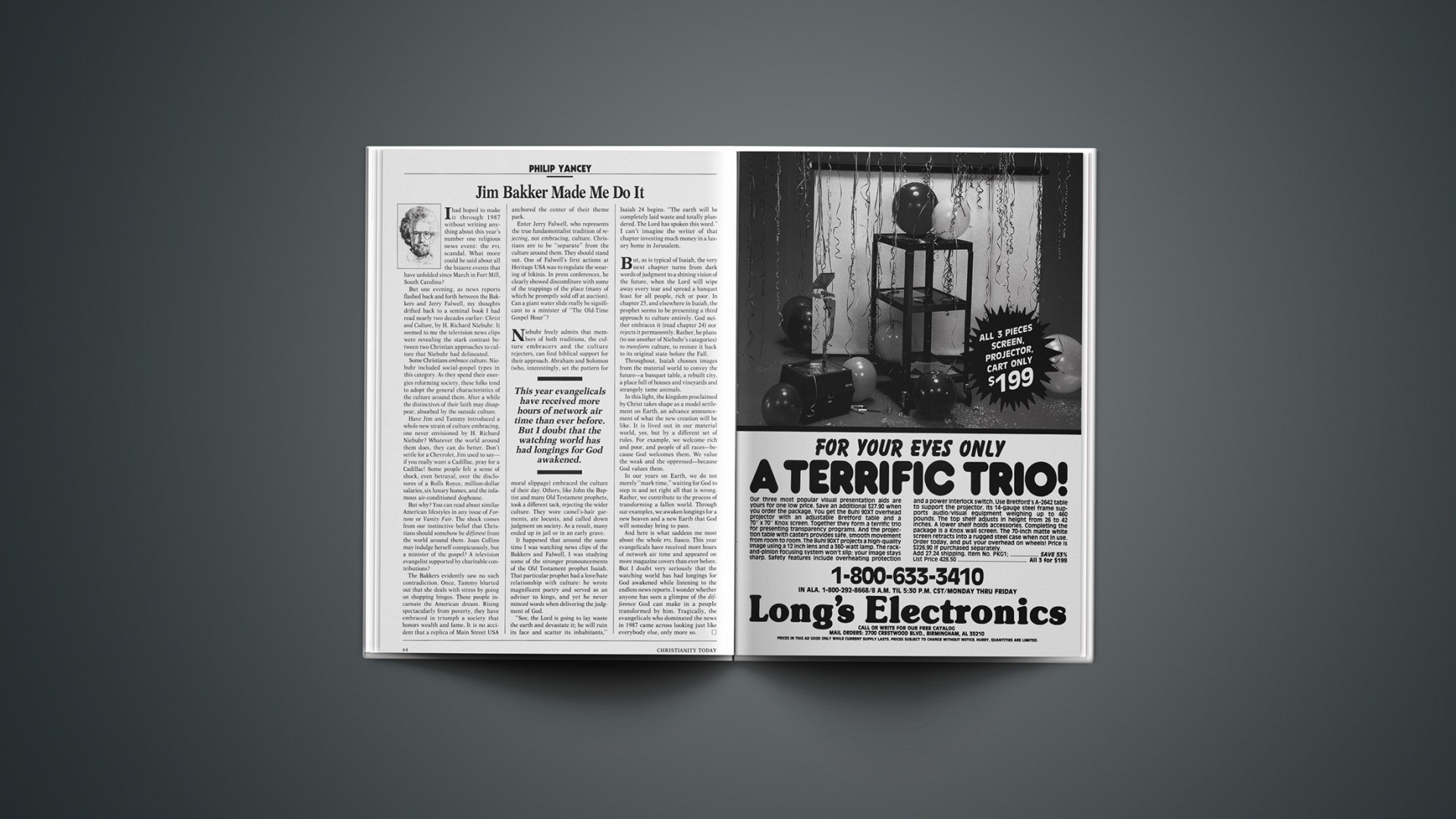I had hoped to make it through 1987 without writing anything about this year’s number one religious news event: the PTL scandal. What more could be said about all the bizarre events that have unfolded since March in Fort Mill, South Carolina?
But one evening, as news reports flashed back and forth between the Bakkers and Jerry Falwell, my thoughts drifted back to a seminal book I had read nearly two decades earlier: Christ and Culture, by H. Richard Niebuhr. It seemed to me the television news clips were revealing the stark contrast between two Christian approaches to culture that Niebuhr had delineated.
Some Christians embrace culture. Niebuhr included social-gospel types in this category. As they spend their energies reforming society, these folks tend to adopt the general characteristics of the culture around them. After a while the distinctives of their faith may disappear, absorbed by the outside culture.
Have Jim and Tammy introduced a whole new strain of culture embracing, one never envisioned by H. Richard Niebuhr? Whatever the world around them does, they can do better. Don’t settle for a Chevrolet, Jim used to say—if you really want a Cadillac, pray for a Cadillac! Some people felt a sense of shock, even betrayal, over the disclosures of a Rolls Royce, million-dollar salaries, six luxury homes, and the infamous air-conditioned doghouse.
But why? You can read about similar American lifestyles in any issue of Fortune or Vanity Fair. The shock comes from our instinctive belief that Christians should somehow be different from the world around them. Joan Collins may indulge herself conspicuously, but a minister of the gospel? A television evangelist supported by charitable contributions?
The Bakkers evidently saw no such contradiction. Once, Tammy blurted out that she deals with stress by going on shopping binges. These people incarnate the American dream. Rising spectacularly from poverty, they have embraced in triumph a society that honors wealth and fame. It is no accident that a replica of Main Street USA anchored the center of their theme park.
Enter Jerry Falwell, who represents the true fundamentalist tradition of rejecting, not embracing, culture. Christians are to be “separate” from the culture around them. They should stand out. One of Falwell’s first actions at Heritage USA was to regulate the wearing of bikinis. In press conferences, he clearly showed discomfiture with some of the trappings of the place (many of which he promptly sold off at auction). Can a giant water slide really be significant to a minister of “The Old-Time Gospel Hour”?
Niebuhr freely admits that members of both traditions, the culture embracers and the culture rejecters, can find biblical support for their approach. Abraham and Solomon (who, interestingly, set the pattern for moral slippage) embraced the culture of their day. Others, like John the Baptist and many Old Testament prophets, took a different tack, rejecting the wider culture. They wore camel’s-hair garments, ate locusts, and called down judgment on society. As a result, many ended up in jail or in an early grave.
It happened that around the same time I was watching news clips of the Bakkers and Falwell, I was studying some of the stronger pronouncements of the Old Testament prophet Isaiah. That particular prophet had a love/hate relationship with culture: he wrote magnificent poetry and served as an adviser to kings, and yet he never minced words when delivering the judgment of God.
“See, the Lord is going to lay waste the earth and devastate it; he will ruin its face and scatter its inhabitants,” Isaiah 24 begins. “The earth will be completely laid waste and totally plundered. The Lord has spoken this word.” I can’t imagine the writer of that chapter investing much money in a luxury home in Jerusalem.
But, as is typical of Isaiah, the very next chapter turns from dark words of judgment to a shining vision of the future, when the Lord will wipe away every tear and spread a banquet feast for all people, rich or poor. In chapter 25, and elsewhere in Isaiah, the prophet seems to be presenting a third approach to culture entirely. God neither embraces it (read chapter 24) nor rejects it permanently. Rather, he plans (to use another of Niebuhr’s categories) to transform culture, to restore it back to its original state before the Fall.
Throughout, Isaiah chooses images from the material world to convey the future—a banquet table, a rebuilt city, a place full of houses and vineyards and strangely tame animals.
In this light, the kingdom proclaimed by Christ takes shape as a model settlement on Earth, an advance announcement of what the new creation will be like. It is lived out in our material world, yes, but by a different set of rules. For example, we welcome rich and poor, and people of all races—because God welcomes them. We value the weak and the oppressed—because God values them.
In our years on Earth, we do not merely “mark time,” waiting for God to step in and set right all that is wrong. Rather, we contribute to the process of transforming a fallen world. Through our examples, we awaken longings for a new heaven and a new Earth that God will someday bring to pass.
And here is what saddens me most about the whole PTL fiasco. This year evangelicals have received more hours of network air time and appeared on more magazine covers than ever before. But I doubt very seriously that the watching world has had longings for God awakened while listening to the endless news reports. I wonder whether anyone has seen a glimpse of the difference God can make in a people transformed by him. Tragically, the evangelicals who dominated the news in 1987 came across looking just like everybody else, only more so.










